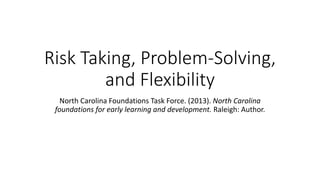
Risk taking, problem solving, and flexibility
- 1. Risk Taking, Problem-Solving, and Flexibility North Carolina Foundations Task Force. (2013). North Carolina foundations for early learning and development. Raleigh: Author.
- 2. Strategies for Infants and Toddlers • Provide plenty of high-quality toys and equipment that can be used in multiple ways • Provide genuine attention, affection, and acceptance. Such support validates children and makes them feel safe to take risks and accept challenges. • Allow children to take risks that do not compromise their safety. • Encourage accomplishments with specific praise of a child’s efforts. Avoid meaningless praise • Accept mistakes, messes, and failures as learning opportunities to try again or try something differently.
- 3. Strategies for Infants and Toddlers (2) • Provide flexibility within a routine • Know your children’s temperaments and willingness or reluctance to try new things. Be intentional and supportive in introducing new experiences and change. • Accommodate differences among children.
- 4. Examples of Support • Have duplicates of favorite toys as opposed to saying, “I’ll put it away until you can share”. • Acknowledge and identify babies’ and toddlers’ feelings with both spoken and body language • Use encouragement and specific encouragement (“You stood up all by yourself!”) rather than meaningless praise (“good job”) • Accept mistakes and failures – “Oh no! The milk spilled. Let’s clean it up” rather than “You are wasting your milk. I guess you’re through because your aren’t getting more!” • Use picture schedules, word and other signals, general and direct modeling, and other supports for both routine and flexibility
- 5. Strategies for Preschoolers • Encourage and support children’s ideas rather than being “right”. It’s the process, not the product • Use “mistakes” as learning opportunities instead of cause for punishment or other negative response. • Model positive responses, including problem solving strategies, to both their mistakes and your mistakes. • Mental model problem solving steps and consideration of possible solutions.
- 6. Strategies for Preschoolers 2 • Model and practice good communication (receptive and expressive) with children, including sharing, listening, and asking questions. • Work with children to try new things, especially those children who may be more reluctant. Introduce “new” gradually and within the context of the familiar • Recognize and understand varying temperaments and ability levels. Accommodate children’s differences with flexibility and needed support • Extend communication with reflective listening to help children better understand.
- 7. Examples for Preschoolers • Mistakes are going to happen. Rather than send a child who made a mistake to time out, use the mistake as a learning opportunity • Picture solution cards provide excellent support as children learn to make choices and problem-solve. The CSEFEL website has some terrific solution cue cards and other strategies to help children with positive social and emotional responses. • Center for Social and Emotional Foundations for Early Learning URL: http://csefel.vanderbilt.edu/ • CSEFEL Solution Kit Cue Cards URL: http://csefel.vanderbilt.edu/modules/2006/solutionkit.pdf
- 8. Examples for Preschoolers 2 • Model reflective listening, asking questions for better understanding, and other positive communication strategies. • Help children extend their play and add new levels of challenge without intervening too long into their play. • Add new equipment, materials, and experiences to enhance the familiar and the favorites. • Collaborate and share with other professionals to learn new ways to work with children who are reluctant to take risks, have difficulty problem-solving, and struggle with change